With over three decades of experience machining precision plastic and composite parts for the Aerospace & Defense industry, AIP Precision Machining knows that weight and strength are critical for your flight-ready hardware. That’s why we’ve carefully selected, machined, and tested all our thermoplastic materials to various aerospace industry standards. Our lightweight polymers and composites have stable chemical and corrosion resistance, as well as improved strength to weight ratios when compared to exotic alloys and non-ferrous metals. AIP’s polymer and composite materials maintain their properties even at high temperatures.
Read more on thermoplastic materials commonly used in the Aerospace & Defense industry for every day to mission-critical applications.
ULTEM – PEI
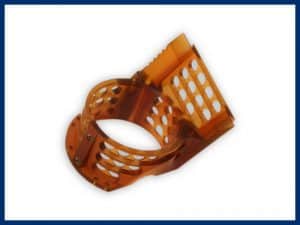 ULTEM has one of the highest dielectric strengths of any thermoplastic material, meaning it works very efficiently as an electrical insulator. Being resistant to both hot water and steam, ULTEM can withstand repeated cycles in a steam autoclave and can operate in high service temperature environments (340F or 170C). ULTEM also has one of the lowest rates of thermal conductivity, allowing parts machined from ULTEM to act as thermal insulators. ULTEM is FDA and NSF approved for both food and medical contact and therefore is an excellent choice for aircraft galley equipment such as ovens, microwaves and hot or cold beverage dispensing systems. UL94 V-O flame rating with very low smoke output makes this material ideal for aircraft interior components.
ULTEM has one of the highest dielectric strengths of any thermoplastic material, meaning it works very efficiently as an electrical insulator. Being resistant to both hot water and steam, ULTEM can withstand repeated cycles in a steam autoclave and can operate in high service temperature environments (340F or 170C). ULTEM also has one of the lowest rates of thermal conductivity, allowing parts machined from ULTEM to act as thermal insulators. ULTEM is FDA and NSF approved for both food and medical contact and therefore is an excellent choice for aircraft galley equipment such as ovens, microwaves and hot or cold beverage dispensing systems. UL94 V-O flame rating with very low smoke output makes this material ideal for aircraft interior components.
CELAZOLE – PBI
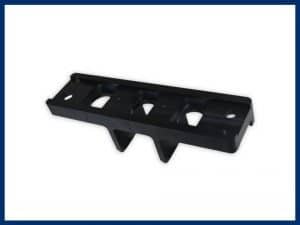 CELAZOLE provides the highest mechanical properties of any thermoplastic above 400F (204C) and offers a continuous use operating temperature of 750F (399C). CELAZOLE has outstanding high-temperature mechanical properties for use in aircraft engines and other HOT section areas. This impressive lightweight material retains 100% tensile strength after being submerged in hydraulic fluid at 200°F for thirty days.
CELAZOLE provides the highest mechanical properties of any thermoplastic above 400F (204C) and offers a continuous use operating temperature of 750F (399C). CELAZOLE has outstanding high-temperature mechanical properties for use in aircraft engines and other HOT section areas. This impressive lightweight material retains 100% tensile strength after being submerged in hydraulic fluid at 200°F for thirty days.
RYTON – PPS
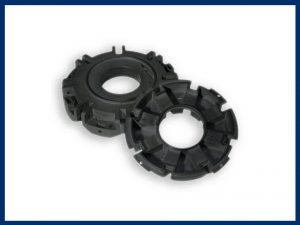 RYTON’s inherent fire retardancy, thermal stability and corrosion resistance makes it perfectly suited for aerospace applications, while its dimensional stability means even the most intricate parts can be molded from RYTON with very tight tolerances. RYTON is typically used for injection molded parts, however, there is limited availability of extruded rod and plate for machining.
RYTON’s inherent fire retardancy, thermal stability and corrosion resistance makes it perfectly suited for aerospace applications, while its dimensional stability means even the most intricate parts can be molded from RYTON with very tight tolerances. RYTON is typically used for injection molded parts, however, there is limited availability of extruded rod and plate for machining.
VESPEL or DURATRON – PI
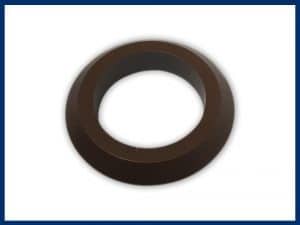 Like RYTON, VESPEL is dimensionally stable and has fantastic temperature resistance. It can operate uninterrupted from cryogenic temperatures to 550°F, with intermittent to 900°F. Thanks to its resistance to high wear and friction, VESPEL performs with excellence and longevity in severe environments—like those used in aerospace applications. VESPEL is a trademarked material of DuPont and can be provided in direct formed blanks or finished parts directly from DuPont. AIP provides precision machined components from DuPont manufactured rod and plate stock. VESPEL is typically used in high temperature and high-speed bearing and wear applications such as stator bushings.
Like RYTON, VESPEL is dimensionally stable and has fantastic temperature resistance. It can operate uninterrupted from cryogenic temperatures to 550°F, with intermittent to 900°F. Thanks to its resistance to high wear and friction, VESPEL performs with excellence and longevity in severe environments—like those used in aerospace applications. VESPEL is a trademarked material of DuPont and can be provided in direct formed blanks or finished parts directly from DuPont. AIP provides precision machined components from DuPont manufactured rod and plate stock. VESPEL is typically used in high temperature and high-speed bearing and wear applications such as stator bushings.
TORLON or DURATRON – PAI
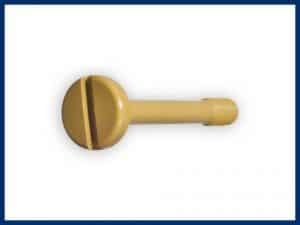 DURATRON PAI’s extremely low coefficient of linear thermal expansion and high creep resistance deliver excellent dimensional stability over its entire service range. DURATRON PAI is an amorphous material with a Tg (glass transition temperature) of 537°F (280°C). DURATRON PAI stock shapes are post-cured using procedures developed jointly by BP Amoco under the TORLON trade name and Quadrant under the DURATRON trade name. A post-curing cycle is sometimes recommended for components fabricated from extruded shapes where optimization of chemical resistance and/or wear performance is required. TOLRON parts are used in structural, wear and electrical aerospace applications.
DURATRON PAI’s extremely low coefficient of linear thermal expansion and high creep resistance deliver excellent dimensional stability over its entire service range. DURATRON PAI is an amorphous material with a Tg (glass transition temperature) of 537°F (280°C). DURATRON PAI stock shapes are post-cured using procedures developed jointly by BP Amoco under the TORLON trade name and Quadrant under the DURATRON trade name. A post-curing cycle is sometimes recommended for components fabricated from extruded shapes where optimization of chemical resistance and/or wear performance is required. TOLRON parts are used in structural, wear and electrical aerospace applications.
TECHTRON – PPS
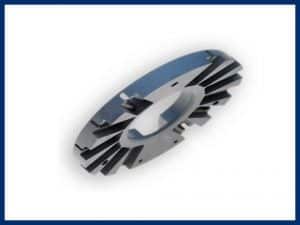 TECHTRON has essentially zero moisture absorption which allows products manufactured from this material to maintain extreme dimensional and density stability. TECHTRON is highly chemical resistant allowing it to operate while submerged in harsh chemicals. It is inherently flame retardant and can be easily machined to close tolerances. It has a broader resistance to chemicals than most high-performing plastics and can work well as an alternative to PEEK at lower temperatures.
TECHTRON has essentially zero moisture absorption which allows products manufactured from this material to maintain extreme dimensional and density stability. TECHTRON is highly chemical resistant allowing it to operate while submerged in harsh chemicals. It is inherently flame retardant and can be easily machined to close tolerances. It has a broader resistance to chemicals than most high-performing plastics and can work well as an alternative to PEEK at lower temperatures.
RADEL – PPSU
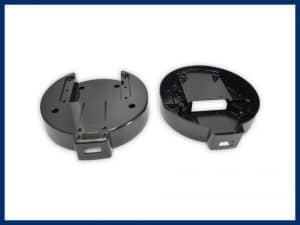 With high heat and high impact performance, RADEL delivers better impact resistance and chemical resistance than other sulfone based polymers, such as PSU and PEI. Its toughness and long-term hydrolytic stability means it performs well even under autoclave pressure. RADEL R5500 meets the stringent aircraft flammability requirements of 14CFR Part 25, allowing the aircraft design engineer to provide lightweight, safe and aesthetically pleasing precision components for various aircraft interior layouts. RADEL can be polished to a mirror finish and is FDA and NSF approved for food and beverage contact.
With high heat and high impact performance, RADEL delivers better impact resistance and chemical resistance than other sulfone based polymers, such as PSU and PEI. Its toughness and long-term hydrolytic stability means it performs well even under autoclave pressure. RADEL R5500 meets the stringent aircraft flammability requirements of 14CFR Part 25, allowing the aircraft design engineer to provide lightweight, safe and aesthetically pleasing precision components for various aircraft interior layouts. RADEL can be polished to a mirror finish and is FDA and NSF approved for food and beverage contact.
KEL – F
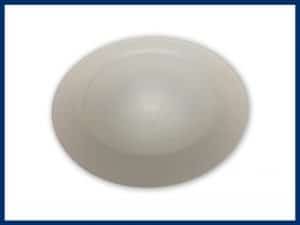 Kel-F is a winning combination of physical and mechanical properties, non-flammability, chemical resistance, near-zero moisture absorption and of course outstanding electrical properties. This stands out from other thermoplastic fluoropolymers, as only Kel-F has these characteristics in a useful temperature range of -400°F to +400°F. In addition, it has very low outgassing and offers extreme transmissivity for radar and microwave applications. Many aircraft and ground-based random applications use Kel-F.
Kel-F is a winning combination of physical and mechanical properties, non-flammability, chemical resistance, near-zero moisture absorption and of course outstanding electrical properties. This stands out from other thermoplastic fluoropolymers, as only Kel-F has these characteristics in a useful temperature range of -400°F to +400°F. In addition, it has very low outgassing and offers extreme transmissivity for radar and microwave applications. Many aircraft and ground-based random applications use Kel-F.
PEEK
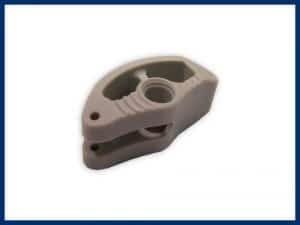 PEEK can be used continuously to 480°F (250°C) and in hot water or steam without permanent loss in physical properties. For hostile environments, PEEK is a high strength alternative to fluoropolymers. PEEK carries a V-O flammability rating and exhibits very low smoke and toxic gas emission when exposed to flame. PEEK is an increasingly popular replacement for metal in the aerospace industry due to its lightweight nature, mechanical strength, creep and fatigue resistance, as well as its ease in processing. Its exceptional physical and thermal characteristics make it a versatile thermoplastic polymer in many aerospace applications. AIP has provided flight control, fuel system, interior, engine and aerodynamic related PEEK components for various aircraft OEM and MRO providers worldwide.
PEEK can be used continuously to 480°F (250°C) and in hot water or steam without permanent loss in physical properties. For hostile environments, PEEK is a high strength alternative to fluoropolymers. PEEK carries a V-O flammability rating and exhibits very low smoke and toxic gas emission when exposed to flame. PEEK is an increasingly popular replacement for metal in the aerospace industry due to its lightweight nature, mechanical strength, creep and fatigue resistance, as well as its ease in processing. Its exceptional physical and thermal characteristics make it a versatile thermoplastic polymer in many aerospace applications. AIP has provided flight control, fuel system, interior, engine and aerodynamic related PEEK components for various aircraft OEM and MRO providers worldwide.
KYNAR – PVDF
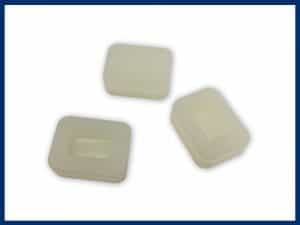 Another example of thermoplastic materials used in aerospace and defense is KYNAR, or PVDF. This polymer has impressive chemical resistance at ambient and elevated temperatures, as well as good thermomechanical and tensile strength. KYNAR is extremely durable due to its weather-ability and toughness even in the most severe environments. In addition to being flame-resistant, KYNAR is easy to machine, too. You can typically find KYNAR components in pipe fitting and various fuel or other fluid-related precision manifolds or connectors.
Another example of thermoplastic materials used in aerospace and defense is KYNAR, or PVDF. This polymer has impressive chemical resistance at ambient and elevated temperatures, as well as good thermomechanical and tensile strength. KYNAR is extremely durable due to its weather-ability and toughness even in the most severe environments. In addition to being flame-resistant, KYNAR is easy to machine, too. You can typically find KYNAR components in pipe fitting and various fuel or other fluid-related precision manifolds or connectors.
Click here to search our material data for more information or request a quote here.

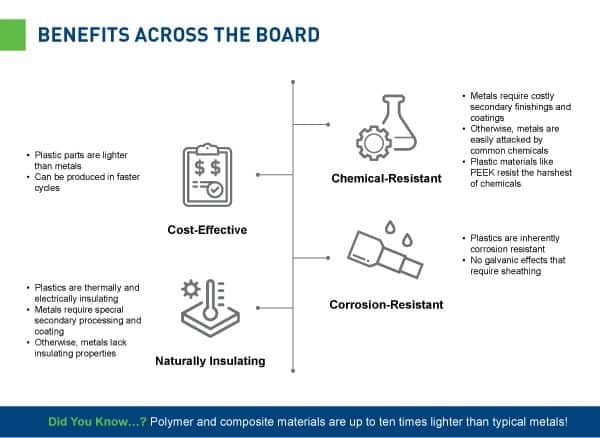
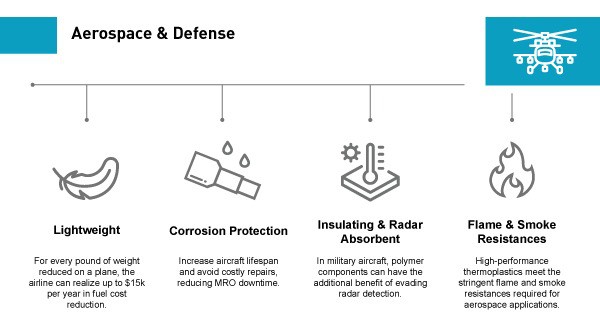










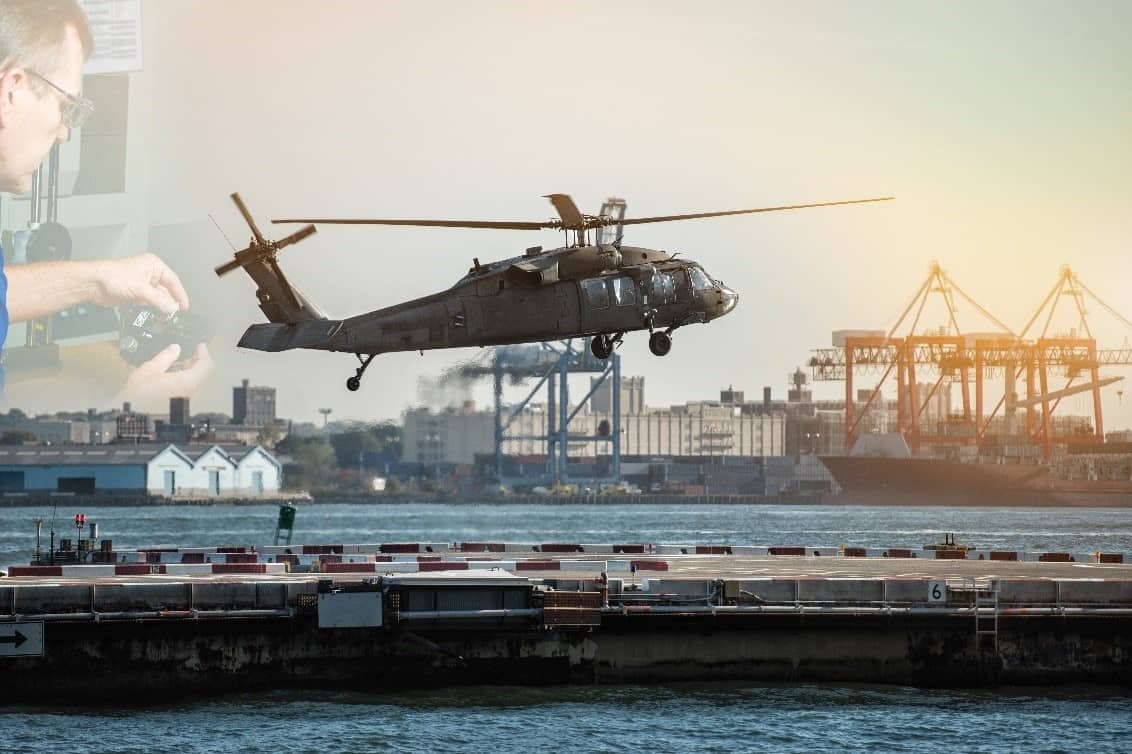 With 36+ years of experience in the industry, our dedicated craftsmen and ties to leading plastic manufacturers allow us to provide you with unrivaled knowledge and consulting in material selection, sizing, manufacturing techniques and beyond to best meet your project needs.
With 36+ years of experience in the industry, our dedicated craftsmen and ties to leading plastic manufacturers allow us to provide you with unrivaled knowledge and consulting in material selection, sizing, manufacturing techniques and beyond to best meet your project needs.